Q2 2023
Hey everyone. I'm delighted to be reconnecting with all of you, all the way from a village in the northeastern corner of France. While I spent most of my summer in Scotland, I then decided to get on the road to spend some time in Wales and France. It’s been a wonderful adventure that is coming to an end very soon. In this report, we are going back in time to see what happened in Q2.
Before we start, here are a few pictures to give you a sneak peek into spring on the island:
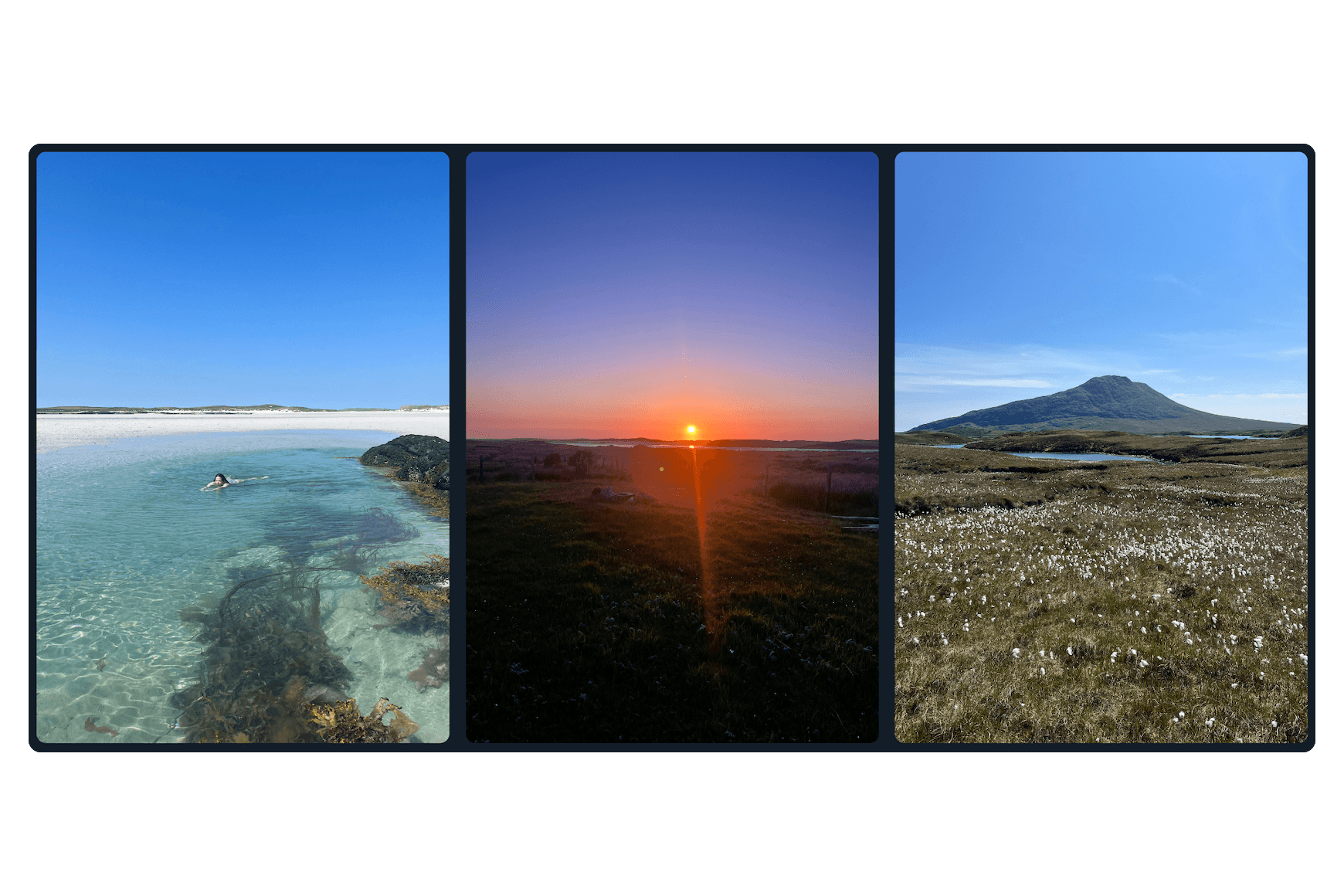
Anyhoo… I am here to tell you the story of our team while we grow our products Wildmetrics and Wild Mail.
As you can guess from the title of this report, it's all about our people and the culture we are trying to build. I’ll share my experiences, thoughts, and learnings as we progress on this journey and open up about the challenges and topics that are perhaps avoided sometimes.
You can find our past reports on our Culture page here. With no further due, welcome back to our Culture & People Report series!
First, here is a quick team update from Q2 2023:
Team update:
As I write this report, Leandro and Andreea are on holiday so I don't have any updates from them to share. They will be back in the Q3 report, promise.
Alban was still travelling in Mexico and spent a few days in Peru and Bolivia.
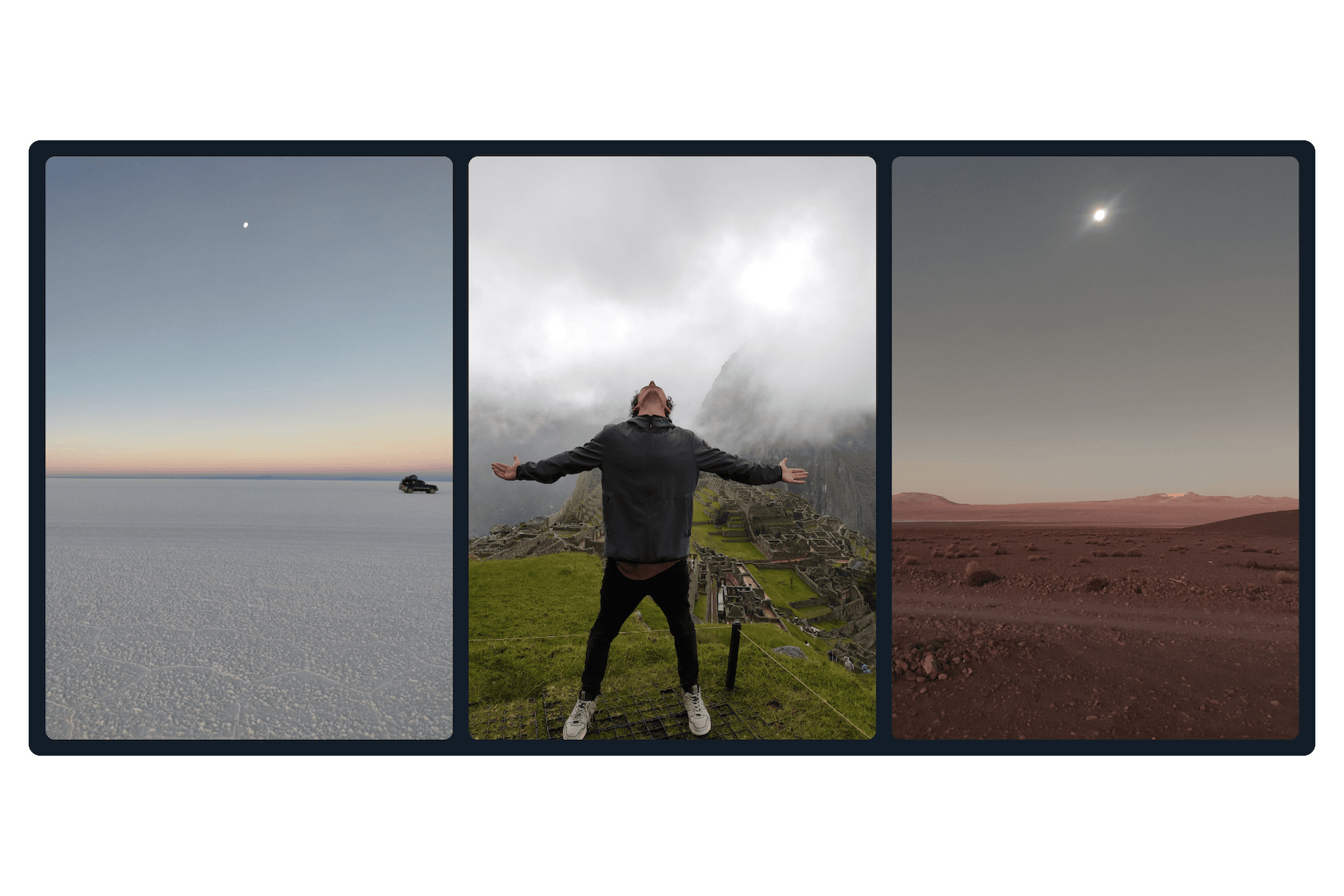
Bastian celebrated his birthday by surfing in the Maldives, went for a romantic trip to Venise with his partner Lena and made great progress on his van renovations.
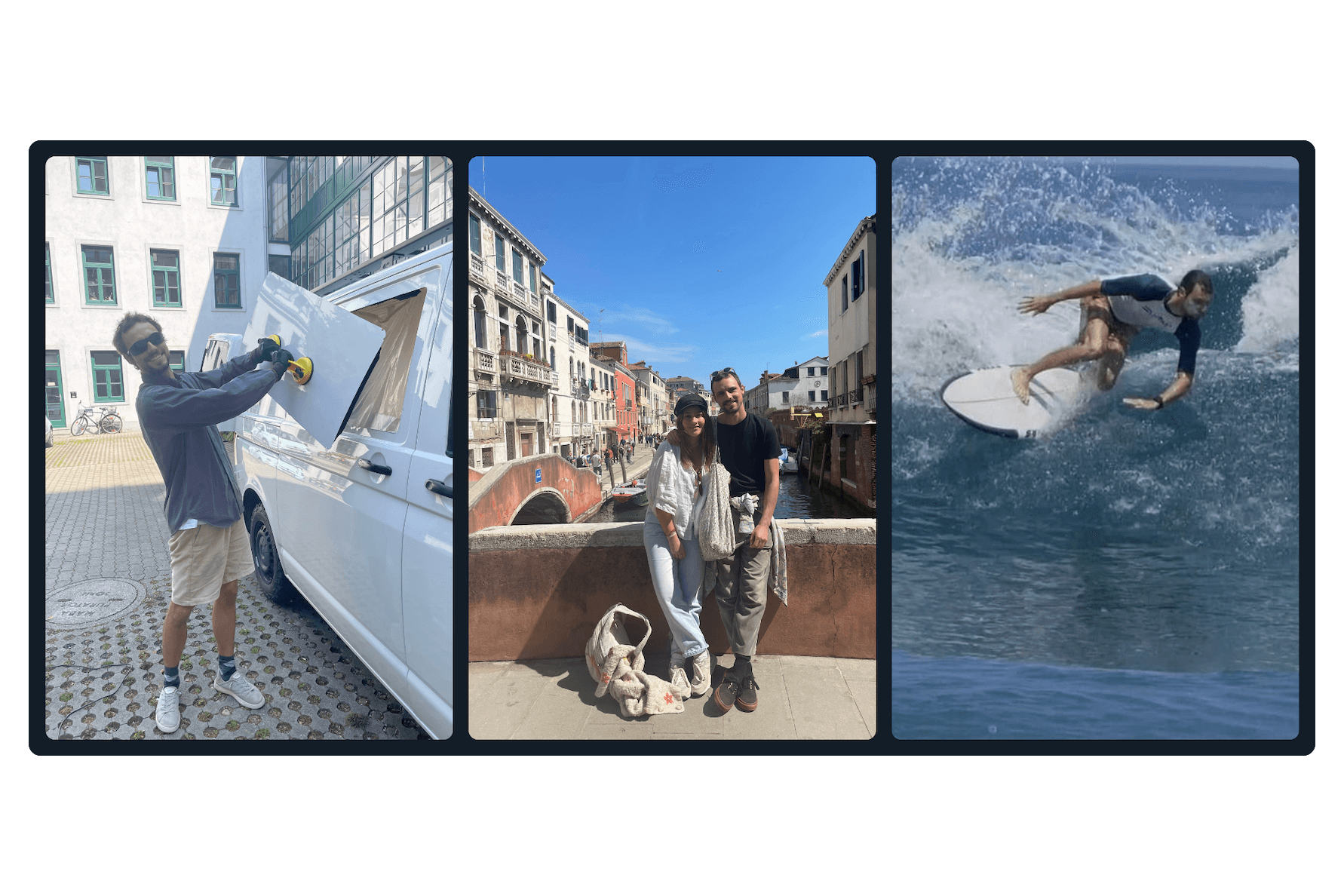
Benji had a CrossFit competition, enjoyed some family time with his little girl and met Bastian in Barcelona.
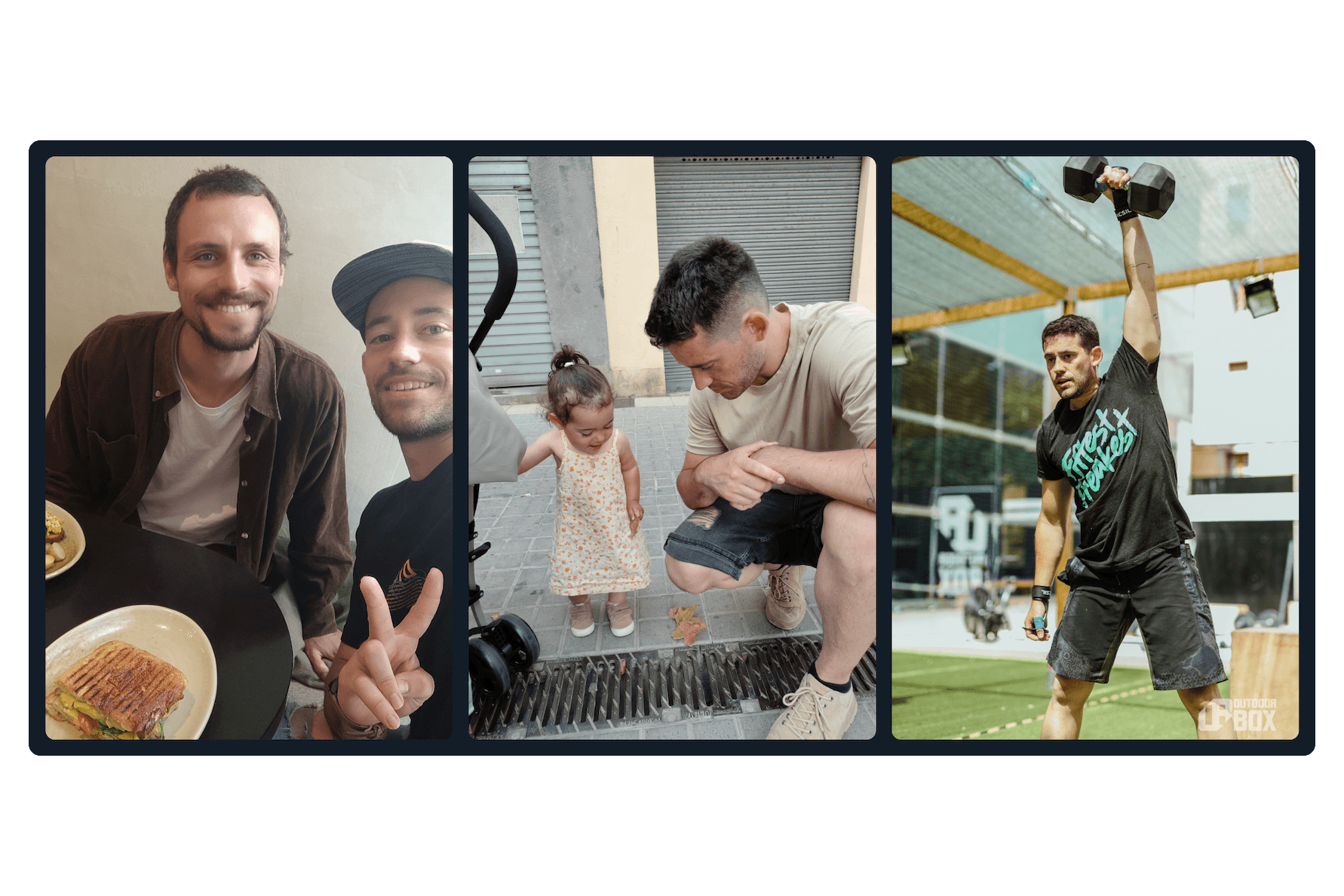
Franco went to see the Bizarrap in concert with his partner and some friends.
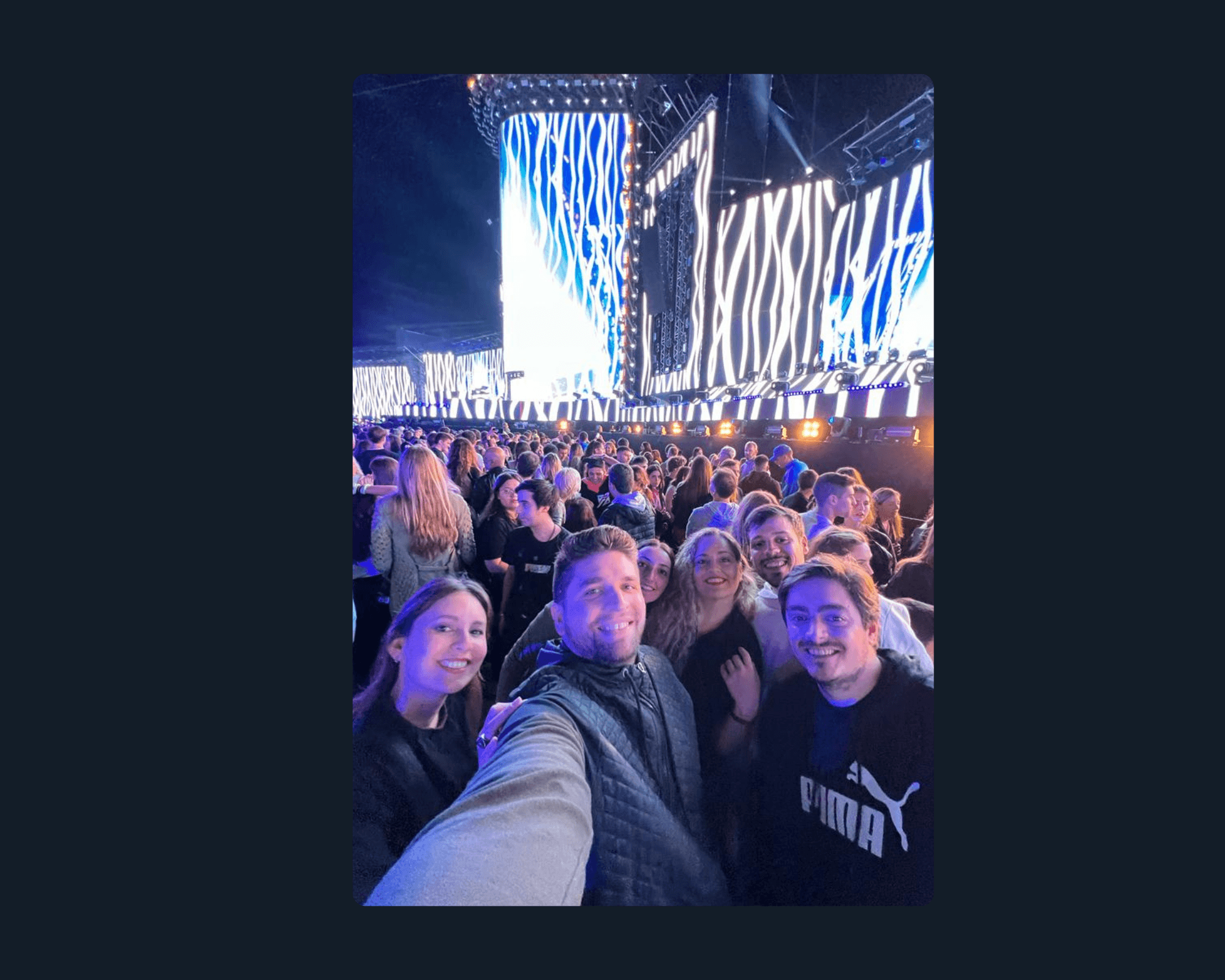
Luis spent a lot of time by the sea and started working in different places around the city. He also went to the NoCodeFest to meet people and build relationships.
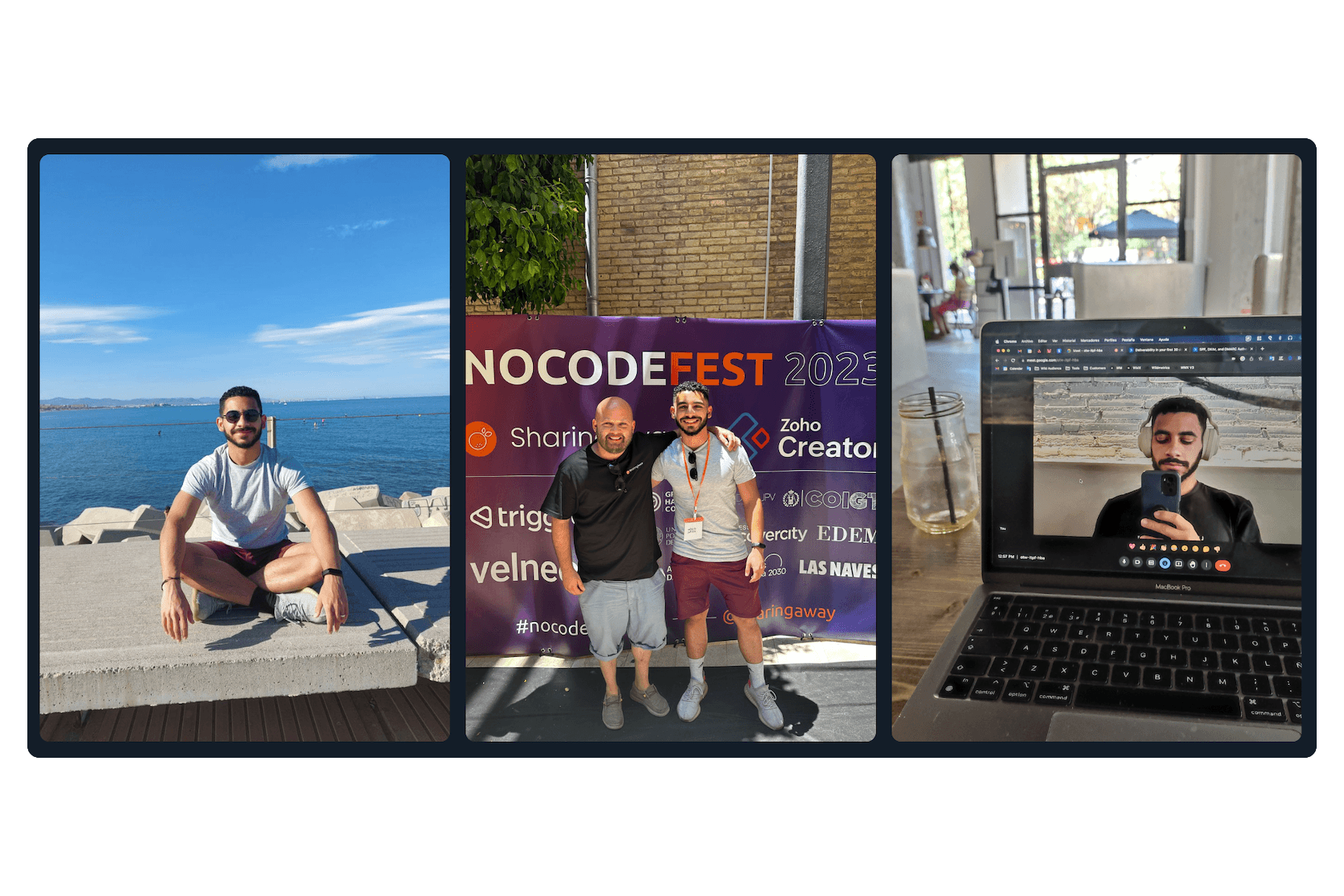
Pancho went to an organic food exhibition and had a weekend by the Parana River, in a town called San Pedro. They also visited the "Parque Nacional Ciervo de los Pantanos" which is a National Park close to where they live and where Eliah loves exploring.
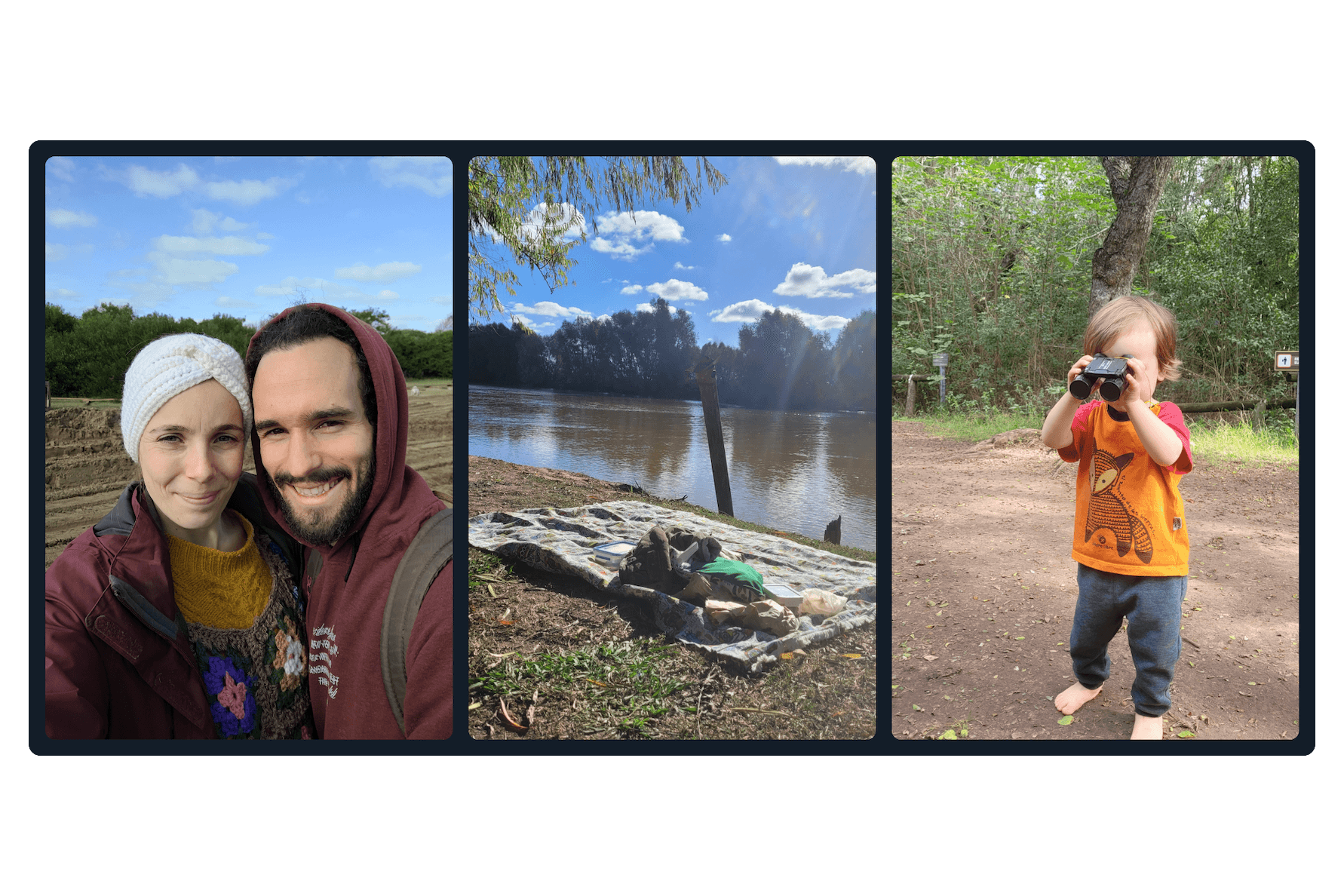
As for myself, I went to France and England to visit friends and family. I bought a new van, got back to the island and summer was here. It was pretty magical. I went to the neighbouring island Lewis and Harris for a little adventure, got my garden going, and read books outside with the doggies.
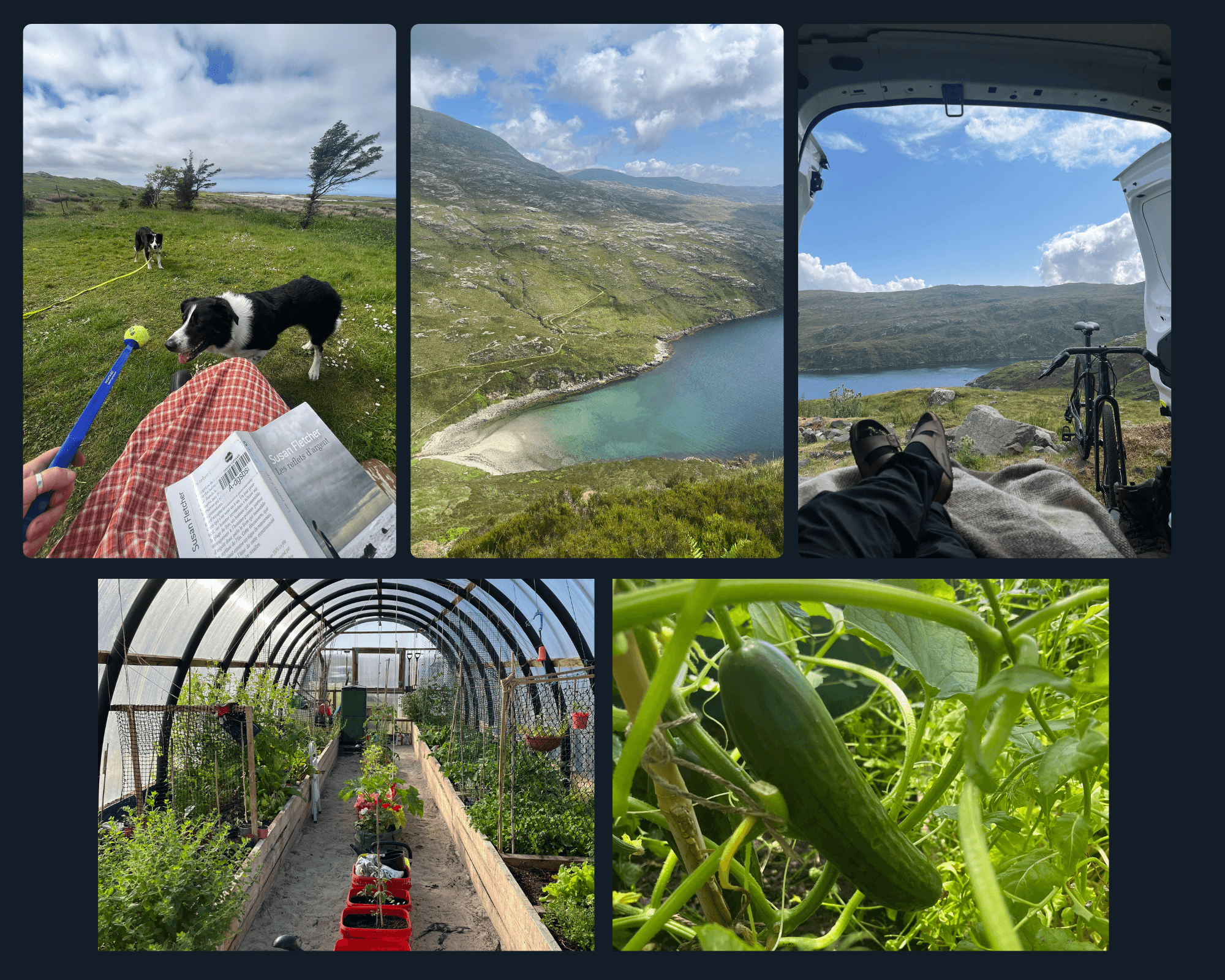
Team meetups
In Q2, Bastian and Benji met in Barcelona while Luis and Andreea worked together in Valencia. Benji also had dinner with Jason and Victor Alcanzar from Digital Riders in Madrid after the SherpaDay event.
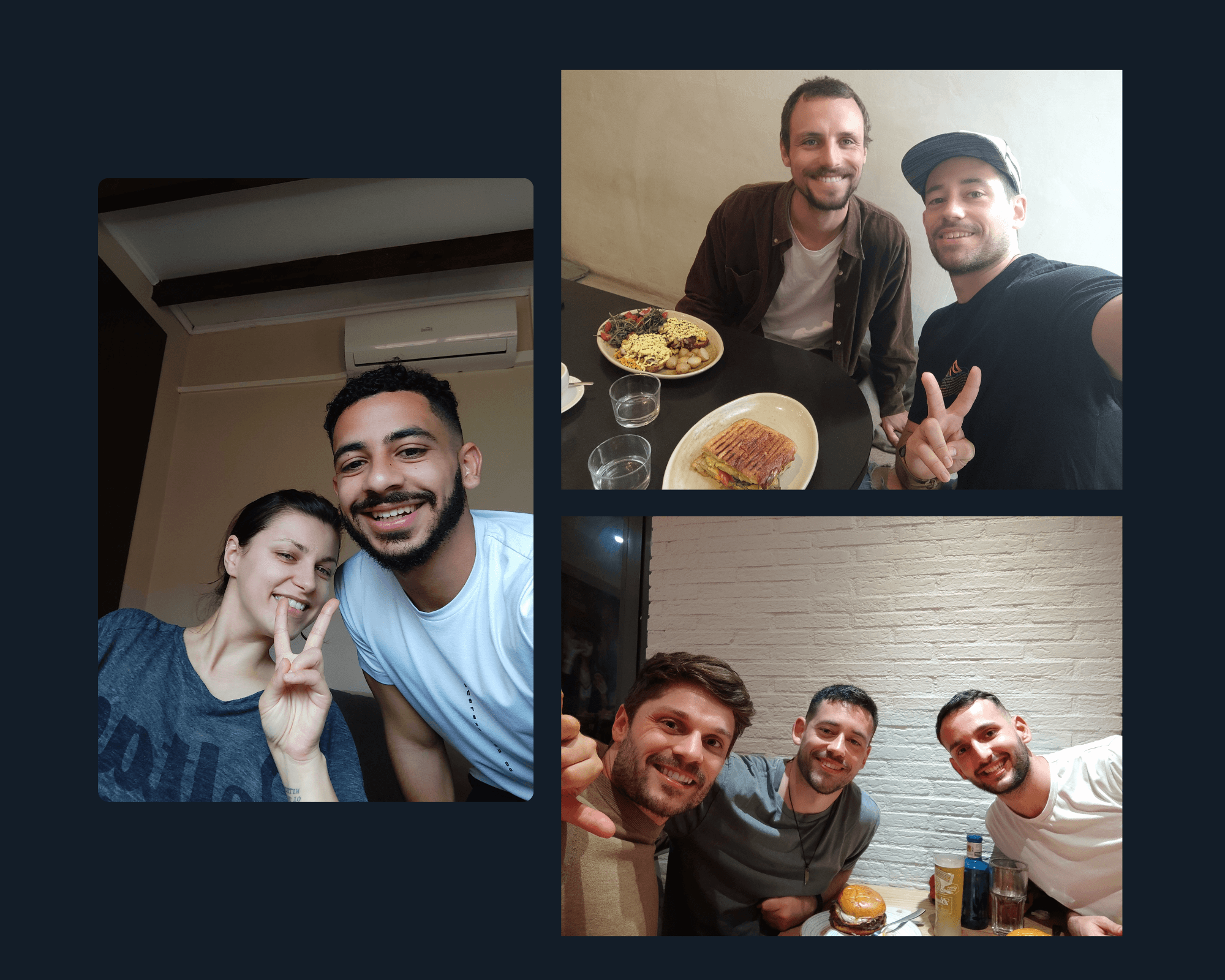
Culture Reflection
Alright, let's dive into the updates regarding the 4-day workweek trials, our exploration of part-time work, and the unexpected yet significant undertaking of crafting a compensation philosophy which kept me busy all Q2.
4-day workweek trials
I completed our first trial successfully in Q2 and never looked back. As you know, I initiated the experiment to share my experience and learnings with the team before they got started. The idea was to show them the way. It created some guidance and reassurance for them and I could make mistakes they didn't have to make.
Everyone documents their 2-month trial by keeping a weekly 4-day workweek diary to share learnings and feelings with the team as we go. At the end of the trial, we put together a little summary which we share with the team on Slack and during our next all-hands meeting.
Implementation? I work from Monday to Friday with the same schedule as before with Friday as a day off. I talk about schedule and not hours. I don’t really want to talk about hours because that’s not really how we work. Hours don’t matter (unless someone works an unhealthy amount of hours), it’s the result and work done that really matter to us. Friday is off by default but I also like the idea of having Friday as a buffer day so kept everything quite open and flexible.
Overall, I found the implementation of this new schedule quite easy and simple to apply. I found the whole process eye-opening and I gained a lot of awareness, especially in the first week. I was starting a big (and totally new) project and quickly felt like I had a ticking clock in my head telling me “Only 4 days left to do everything”. I found myself feeling stressed working way more than before. I didn’t ship my project and was frustrated and quite frankly disappointed. It didn’t take me long to realise that it was due to the nature of my project and a lack of clarity. This taught me a lot right from the beginning and challenged my work methods and routine. This was a great way to start this trial.
I became more aware and more intentional in the way I structure my week thus improving everything from learning how to ask for/give more clarity on the projects I am working on, communicating, and prioritising tasks, to decision-making. I started a new start-of-the-day routine and end-of-the-day routine. Introducing the 4-day work week really forced me to review the way I work and actually challenged me to have a better routine as I went along. I also have an end-of-the-week routine on Thursday evening to wrap up everything and communicate with everyone before logging off.
Balance? By the end of the trial, I felt more relaxed, and at peace. Being intricately linked meant that improving my work routine automatically improved my personal life. It introduced more structure into my life in general which I didn’t realise was needed. I could feel an increase in work satisfaction on a Thursday evening and could disconnect without a feeling of unfinished business or stress. I also introduced a personal no-screen policy to address this persistent discomfort coming from too much time spent on screen that I felt was defining my life. I now have more time for my personal life, to nurture my in-person relationships and my passions outside work. This has brought so much clarity in all aspects. I show up on Mondays feeling totally relaxed, focused, and with complete clarity on my week ahead.
However, what needs to be said is that a 3-day weekend doesn't replace the necessity of taking longer breaks. These extended periods away from work are crucial in allowing us to fully recharge, disconnect from work-related stressors, and simply live our lives. Balancing both regular short breaks and longer vacations is key as each serves a unique purpose in fostering mental, emotional and physical restoration. I'll touch more on this in my next report.
Productivity and work satisfaction? As mentioned above, my work satisfaction has greatly increased since changing to a 4-day work week. I feel more satisfied and more accomplished after my work week. As for productivity, I feel as productive and often more productive than before. I noticed a great change in procrastinating too because let’s be honest, we all do sometimes. A great example is regarding my monthly recurring operational tasks which used to take me 3 to 5 days and now take me 1 to 2 days.
It's important to acknowledge that my productivity is sometimes impacted by external factors that can potentially disrupt even the most optimal 4-day workweek routine. This will always happen, and it is important to accept that some things are out of our control and will impact us in some ways.
Transition & adaptability? There will be a period of transition depending on your role and the way you work. I am not biased either, I don’t think the 4-day workweek model works for everyone. Each person will have to find what works for them. The key for it to be successful is to create a 4-day workweek routine that works for you and fits your life while also keeping in mind that it is not a miracle solution. Acknowledging that this structure won't universally fit all roles or individuals, you understand the need for a more tailored, personalised approach. A 4-day workweek is not a one-size-fits-all solution; each person's role and circumstances play a crucial role in determining its feasibility and success.
Flexibility and final reflection: I mentioned above that this model doesn’t work for everyone and the approach needs to be tailored. Flexibility is also so important to us so implementing a 4-day work doesn’t mean that there is no more flexibility from Monday to Friday. While introducing a 4-day work week, it's crucial to maintain an adaptable mindset that accommodates the diverse requirements of your team. Each individual's work style, responsibilities, and personal situation can differ significantly, necessitating a nuanced approach.
Challenges and questions?
How to implement a 4-day work week for the customer support team which is currently made up of one person only.
How to keep being flexible to allow non-linear work within the 4-day workweek model.
What’s next? By the end of Q4, 90% of the team will have completed the 4-day workweek trial and hopefully found a routine that works for them. For those who find that it doesn't align with their needs, they are free to explore alternative ways of working that better suit them. Our aim is to ensure everyone has a productive and fulfilling work routine.
By offering both a defined structure and the freedom to adapt within it, the 4-day work week seems to be a good option for now. However, we understand that things could change down the line. We're committed to staying open to new ideas and making adjustments to keep our team happy. Flexibility is key, and we're here to ensure the best for our team, both now and in the future.
Part-time work
Here is a little reflection on part-time work by Pancho himself. I thought it was best for him to share his experience with you directly.
Introduction: By the end of 2022, I found myself in the middle of personal and family struggles. During the same year, I relocated with my entire family from Germany to my native country, Argentina. Starting a new life in Argentina proved to be far more challenging than I had anticipated. Among different circumstances and personal wishes, such as wanting to spend more time with my children on a daily basis, having more opportunities for personal activities, and feeling overwhelmed, stressed, and unfulfilled by my work, family, and daily routine, I felt the need for a change. Everything was unclear, but I knew I needed to take action in some areas of my life. I wasn't sure how or when this change would happen, but I wanted to create the space and time to figure it out the best as I could. Out of this context, reducing my working time idea emerged.
Climax: The few months came in many shapes and forms. Since I started this project during the Argentinian summer holidays, the real challenge was going to be from March.
Working part-time, as the whole concept says, means, generally, more available time for you. Most of the time I have used it to establish my situation in the house. Helping my elder son, Marlon to seek better engagement with school and friends, helping Mona, my partner for better engagement with Argentinian society, and simply being with the little Eliah supporting his needs. 2022 was not an easy year for my elder son at school. We chose an alternative school in relation to where he was going in Germany and he had to get used to a whole new language, a new culture, and so on. He'd wished in the past that I take him to and pick him up from school as much as possible and it wasn't really an option. This changed when working part-time and I could do it the whole first half of the year.
Of course, there was some time for some new personal adventures too. I started playing football again, continued my drums lessons, started German lessons, and made a lot of plans with my family for the future (a new house, a trip to Europe, and whatnot…). It has also proved to be a wonderful choice when travelling for me. For 6 weeks, I’ve been in Europe visiting family and visiting around. Having the freedom to work some hours, and then go to enjoy your day is a fantastic experience.
On the working side, I felt that my contribution to WA was way more focused and significant. I had a lot more energy for work every day. I did feel a bit uncomfortable sometimes not being at the same pace as the rest of the team and I had to learn how to pace myself. I ended up working longer hours many times because it was beyond my possibilities. I could do it; I was used to working more hours. So if don't have self-discipline, you can easily end up working more than scheduled. Given the particular shape of my experience, I had to work alone at times and with the team at other times. Neither is better than the other. There are simply moments when one is more suitable than the other. Even though working alone offers more freedom, I would say that I prefer working with a team. During this period, I did feel some disengagement with the team and the main projects. I am not necessarily saying that this is related to part-time work, it is more related to my own overall experience.
It's also worth mentioning that working part-time obviously has a financial impact. During these months, I was earning half of what I was earning when working full-time. Even though it makes complete sense to use this option when necessary, it is not a possible long-term option for me at the moment.
Denouement: In September 2023, I will rejoin the full-time team while taking part in a trial period along with the rest of the Engineering team to implement a four-day workweek. I'm thrilled to be back with the team on a full-time basis and excited about our future projects. I would recommend to the rest of the team members to have this option available for a defined period of time when life becomes too stressful or overwhelming, or during a period of time when you want to give particular attention to something else, like your family or travelling.
Compensation Philosophy
What is a compensation philosophy?
In essence, a compensation philosophy is a statement or guiding principle that outlines a company’s approach and beliefs regarding how it compensates its employees for their work and contributions. It is a framework that guides compensation practices in an inclusive, transparent, reliable and equitable manner. It's not just about paying employees; it's about aligning compensation practices with business goals, culture, and values, the company's needs to achieve sustainable success and everything in between.
Why did we decide to create a compensation philosophy?
We are well aware that our company is still in the early stages and having a compensation strategy sounds ridiculous to most people. However, to us, it makes total sense. Creating a compensation strategy totally aligns with our company culture and values and creates clarity for our team. A well-crafted compensation philosophy goes beyond just financial transactions; it conveys a powerful message to our team about our commitment, and appreciation for them:
you invest in your people and demonstrate a proactive investment in your employees' well-being and professional growth.
you recognise and acknowledge the dedication and hard work of your team. It communicates that their efforts do not go unnoticed and are directly recognized through fair and competitive compensation.
It demonstrates that you are invested in helping your employees progress in their careers and achieve their goals within the company.
you reinforce the fact that you are people-first. Creating a compensation philosophy that aligns with employee needs and expectations reinforces that your organization places its employees at the centre of decision-making. This empowers your team and builds a sense of ownership and belonging.
you nurture trust and loyalty by making your team feel that their contributions are valued and rewarded appropriately.
you become attractive to both potential and existing employees by communicating your commitment to employee well-being through your compensation philosophy. This can have a significant impact on retention rates and recruitment efforts.
you boost the morale of your team and create an environment where employees feel motivated to consistently perform at their best.
you encourage transparency and open communication and thus enhance trust between leadership and employees.
Wild Audience Compensation Philosophy
Our compensation philosophy defines how we compensate team members, including everything from salary to profit sharing, health and well-being, learning & development, pension, and whatnot. We aim to compensate our team members well and attract the people we need to attain our objectives by creating a reliable, inclusive, and empowering compensation philosophy to create a work environment where everyone can thrive. We want this philosophy to make everyone feel seen, appreciated, valued and respected for who they are and what they bring to Wild Audience.
What's the status of this project?
We have worked on two big topics already: salary and profit sharing. Considering the nature of the topics, this took us a few months. We will continue to work on the others as we go along and improve everything already existing. I'll share more about this soon too.
This concludes my report, everyone. If you've made it so far, thank you for reading and I hope you enjoyed it. As always, if you have any questions or feedback please do share it with us.
I'll see you in the Q3 report for updates on:
Summer holidays for the team
Team meetup in Barcelona
4-day workweek trial for the growth team
Update on our compensation philosophy
See you soon :)